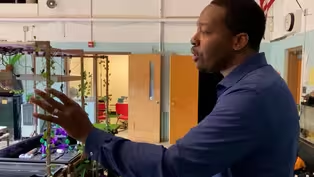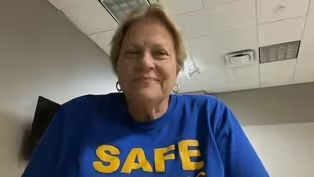NJ Spotlight News
NJ Spotlight News: July 11, 2023
7/11/2023 | 26m 46sVideo has Closed Captions
Watch as the NJ Spotlight News team breaks down today's top stories.
We bring you what's relevant and important in New Jersey news, along with our insight. Watch as the NJ Spotlight News team breaks down today's top stories.
Problems playing video? | Closed Captioning Feedback
Problems playing video? | Closed Captioning Feedback
NJ Spotlight News is a local public television program presented by THIRTEEN PBS
NJ Spotlight News
NJ Spotlight News: July 11, 2023
7/11/2023 | 26m 46sVideo has Closed Captions
We bring you what's relevant and important in New Jersey news, along with our insight. Watch as the NJ Spotlight News team breaks down today's top stories.
Problems playing video? | Closed Captioning Feedback
How to Watch NJ Spotlight News
NJ Spotlight News is available to stream on pbs.org and the free PBS App, available on iPhone, Apple TV, Android TV, Android smartphones, Amazon Fire TV, Amazon Fire Tablet, Roku, Samsung Smart TV, and Vizio.
Providing Support for PBS.org
Learn Moreabout PBS online sponsorshipX nursing strike authorized.
Health care workers at Robert Wood threaten to walk off the job after failed contract negotiations.
Calling for will hit the picket line.
>> We need staffing every day, every minute.
>> A new report finds pregnancy related deaths among black women doubled over two decades.
It could take years to see if recent efforts paid off.
>> I would not be alive today had I not been my own advocates.
>> Greener days ahead in Ocean County.
Celebrating the opening of its first two cannabis dispensaries after being a legal weed desert.
>> Lots of possibilities for the future.
>> Segregated schools.
New Jersey's public school system is among the most segregated in the nation even after the Supreme Court declared it unconstitutional 70 years ago.
>> If you are going to try to force towns or districts to get together, you could face pushback.
Briana: NJ Spotlight news begins now.
>> Funding for NJ Spotlight News is provided by NJM Insurance .
RJ Barnabas health, let us be healthy together.
And Orsted, committed to the creation of a new long-term, sustainable, clean energy future for New Jersey.
♪ >> From NJPBS, this is NJ Spotlight news.
Briana: Thanks for joining us this Tuesday night.
A workforce in distress.
We begin with another strike authorization by health care employees in the state who say they have reached a breaking point.
This time it is nearly 1800 nurses at Robert Wood Johnson University Hospital.
The overwhelming majority, 96%, voted Monday to reject a contract settlement with the facility.
After three months of failed negotiations.
Lack of staffing is the top issue according to union leaders but they are seeking better pay, retirement benefits and caps on insurance costs.
The hospital says it is disappointed with the vote and has the utmost respect for the nursing staff who are now working with an expired contract.
The hospital has been giving a -- has been given a 10 day notice starting today allowing both sides to continue negotiating.
But can they strike a deal?
I am joined by a registered nurse at the hospital and president of the United Steelworkers local 4200 representing the nurses.
Judy, welcome.
Good to have you.
How dire of a situation is this that the majority of your nursing staff has felt the need to authorize a potential strike here?
Judy: I think it sends a strong message that the nurses whether they be nurses who have been at the hospital a long time, nurses that are new to the hospital, support safe staffing.
the hospital has added positions over the past year, but the staffing levels are not where they should be on a daily basis.
Some days you come in and the staffing is good and some days the staffing is not good.
You can't have a 1:3 ratio on ICUs.
Briana: When you talk safe staffing it is not just numbers, but also the level of interest to shall knowledge and what have you.
The Hospital says in response to that, it hired 100 registered nurses along with other tech and medical positions there.
Is that not to the experience level that you all would like and need to see?
Judy: I think what it comes down to is yes, Robert Wood New Brunswick is a level one trauma center.
I have worked there almost 30 years and it has been my whole career.
I do love my job and I do love the hospital.
It is just that when you go in there and the safe ratios are not done on a daily basis, it is not fair.
and we want to make sure there is enough nurses with enough knowledge to take care of that.
Our hospital is staffed with 120 travelers.
So that shows that we need staff still.
Briana: Let me get you to respond to the statement today the hospital said the offer it had given the union, the pay is 14% higher than the average pay for comparable hospitals that you are among the highest paid among your peers in the state.
What do you say to that?
Judy: I say to that yes, maybe one year to five years was given a considerable raise.
In the beginning of so they March.
brought them up 14%.
They had to.
Every other hospital in New Jersey had brought their members up to that, so they were just bringing them up to what facilities down the road have brought them up to.
We did not get 14% in the 10-year and above level so that is not something that is accurate.
Briana: Judy, lastly, what would a strike look like both produce -- for you, someone who has been on the job for many years, and as you said, very dedicated to the work, and also for the patients?
Judy: the patients like I said you know, the travelers, they come in, if you have travelers during a strike basically they are there for the money.
That is totally what they are there for.
I just think that we need to make safe staffing and make our contract a strong contract so that it goes on for the life of the hospital.
Travelers are not there and they are not people who will give their heart and soul like we do.
They are just temporary employees and we have to have staffing that is safe every day, every year, every minute.
Briana: Travelers referring to traveling nurses that we have seen since the COVID-19 pandemic .
Judy, thank you so much for your time.
Judy: thank you.
Thanks.
Briana: Specialized nurses have been one of the key elements in the Murphy administration's plan to reduce maternal mortality rates but a recent report from the Journal of the American Medical Association finds pregnancy-related deaths for black women in New Jersey have been one of the worst in the country for the last two decades.
That is all despite the high ranking for income levels, education and health care.
Brenda Flanagan reports that many are waiting to see what all of the recent efforts here what -- will make real change.
>> My son would not be here.
I would not be alive today if I had not been my own advocate.
>> She recalls multiple trips to the ER not long after delivering her baby boy.
Foster's blood pressure had soared dangerously high after repeatedly being sent home.
The public health worker stood her ground and fought for her life.
>> I kept showing up saying something is not right with me.
I just had a baby.
I need you to check me out.
I kept showing up until literally the last time I showed up I knew I was dying and I literally said to the nurse, this is the type of work I do.
I know black women and black babies are dying at a higher rate in New Jersey because of pregnancy complications.
Like I need you to take me seriously.
Brenda: They did and she survived postpartum preeclampsia and delivered king after suffering two devastating miscarriages she believes were preventable.
and she is not surprised by a new JAMA study showing the rate of black women dying while pregnant during delivery or a year after giving birth double from the late 1990's to 2010 in New Jersey.
But maternal mortality rates in New Jersey went from 54.5 per 100,000 births to per 100,000 110 birth over the past two decades and she is not surprised.
>> I believed that not being listened to is a huge part of the problem.
I feel like nobody knows our bodies better than us.
>> I do think we have a broken health care system that will require us to you know fix policies and increase the amount of access that patients have to providers and resources.
Brenda: This Dr. says the issue is complicated in the study pointed out that black women are more likely to expense hypertension and hemorrhage in a health-care system where equity remains a challenge and investigators found again that black maternal mortality rates led by a large margin with 110 per 100,000 births compared to other groups, Native American , white, Hispanic, and Asian.
>> The article points to the trend across the entire nation has increased.
We are the only country that continues to have worse outcomes and we still put a lot of money towards our care.
Brenda: some experts believe Medical Center should revise protocols for treatment.
Jersey's Department of Health recently awarded $3.5 million in grants to improve maternal care across the state by funding long-term postpartum care, breast-feeding and family education to help fill in the gaps in health care.
>> The foundation of all this is listening.
More people are around to listen, the more we can understand and be able to fill in those gaps.
I really believe that.
>> I am teaching women basically how to do things for yourself.
While we are working on changing the system.
Brenda: Foster founded a blog called life after two losses where she advises black women they need to advocate for themselves and push their providers to listen and be aware of stereotypes.
Her son King is now a thriving two-year-old.
Waxy is my whole world.
-- >> He is my whole world.
my whole world, and as I say that I feel like the tears welling up because I fought so hard right?
Brenda: advocates say there is no quick and easy fix and that it will take a significant investment over perhaps a decade working to achieve health care equity.
In new work, I'm Brenda Flanagan, NJ Spotlight News.
Briana: The NAACP is promising to challenge the New Jersey state police over alleged bias and discrimination practices.
Today, leaders from the New Jersey chapter called on the Department of Justice to begin investigating the state's law enforcement agency sending a letter to the U.S. Attorney General Merrick Garland airing their grievances, accusing the police agency of denying promotions to openly gay troopers and passing over Hispanic members in favor of their white male counterparts for promotions among other allegations.
Now it is not the first time the NAACP has taken New Jersey's state police to task.
There are over 17 active lawsuits against the police department.
With claims of discrimination based on race, gender and sexual orientation.
The New Jersey state police did not return our request for comment in time for this broadcast.
The NAACP says it is enlisting the help of the powerhouse Burnham Douglass Law firm as it takes on what it calls one of the most powerful organizations in the state.
>> The New Jersey state police over the long haul of the years has proven themselves as an equal opportunity discriminator.
And so we are here today.
The NAACP is deeply troubled by the recent allegations of racial discrimination as well as -- against major Brian as well as discriminatory practices against other minority troopers and the New Jersey state police.
These allegations are consistent with a long history of discrimination within the state police.
Briana: Nearly two years since the U.S. pulled the last troops from Afghanistan, the United States has seen an influx of immigrants and refugees from the country.
Now the Biden administration is offering a temporary fix starting this summer for those who remain in limbo.
It is known as the re-parole assess and allows certain refugees to remain in the country as long as they qualify for asylum.
Senior correspondent Joanna Gagis spoke with one person who risked it all to be here in the -- and the organization working to get others settled.
>> I have a permit that I got two years ago and it will expire in a couple months.
>> He is coming to the end of his parole protection granted when he and his family escaped Afghanistan two years ago during operation allies welcome, the final evacuation of the U.S. military from Afghanistan.
>> We ended up moving to America and it was the biggest decision of our lives and basically the main thing we need is, I need especially, my green card.
the process is going very slowly because me and people like me are worried that we kind of don't belong here and that we can be kicked out.
Joanna: more than 13,000 Afghans were temporarily housed at joint base McGuire during operation allies welcome and hundreds resettled in New Jersey.
He is one of more than 70,000 total Afghan parolees who could have their temporary status extended under a new plan announced by the Biden administration that allows them to reapply for parole or, re-parole.
>> Under parole, which is a tool that provides limited protections and benefits and access to work authorization but it is temporary and only lasts two years and we are almost two years after the evacuation in the fall of 2021 so many Afghan parolees are facing the pending expiration of their parole.
Joanna: Church world service has been working to reach as many as they can to help the parolees through the arduous application process.
>> I will go over what it isn't -- what the application process is and the nuances they need to be familiar with and then throughout July and August I will be working in various clinic models to provide assistance to the clients, so we will be doing clinics with volunteers from my colleagues, from law students in the area, firms we partner with, to provide assistance.
Joanna: advocates are saying the American government owes these parolees permanent status because of the role they played in helping the U.S. military in Afghanistan.
>> We have people who were risking their lives every single day who may have been interpreters so that whenever the U.S. military went in Afghanistan they were able to communicate with the locals and who were soldiers.
They were on duty, on the front lines with American soldiers, fighting against the Taliban and trying to protect their country.
Joanna: there is a bipartisan bill that stalled in Congress called the Afghanistan adjustment act that would provide special status for Afghan parolees and some Republicans in Congress say they have not been vetted enough to provide that permanent status .
We reached out to all three of New Jersey's Republican representatives, and have not heard back but CWS employees reject that notion.
>> They know who they brought in , right?
Like, they might not be able to state that they have done the same checks that they do through the asylum process and they might have extra checks to do but I do not think it is fair to say that people have not been properly vetted because they went through multiple, multiple vetting process is to be here, and the government has a sense of who we have with them.
>> when we evacuated people from Vietnam we brought them under parole and swiftly passed the adjustment act.
It is time now, almost two years after the evacuation, to provide a clear and stable and secure path to status for Afghan evacuees.
Joanna: many will see their parole expire this summer even if they completed their re-parole application leaving them unsure of their future.
I'm Joanna Gagis.
Briana: In our spotlight on business report tonight New Jersey is now more than a full year into recreational cannabis sales, but Ocean County has been the state's most glaring holdout.
Of the 33 municipalities, only six allow any type of weed business.
This week, the Jersey shore is putting itself on the map opening a recreationale and the medicinal dispensary.
As Melissa Rose Cooper reports there are still other issues within the industry advocates say are not being addressed.
Melissa: Cannabis customers in Ocean County have a place closer to home where they can make their purchases.
The social leaf open Friday.
It is in South Toms River.
It is the first recreationa facility to begin sales in the county.
Ask the road was very long.
Five years ago I met with a friend that was talking about getting into it, so the journey really began then.
Melissa: Before it opened, customers would have to travel long distances to access recreational product.
Now, the owners from the area are excited to provide services right in their backyard.
>> I grew up right here and this is South Toms River right here.
The other ones, they are corporate from out west.
We plan on putting money back into South Toms River.
Melissa: South Toms River's Mayor agrees that the sales the dispensary generates will improve the community.
>> We have 4000 people one square mile.
We are very limited what we can offer our residents but this will add, we can add to our Police Department and our public works department.
Our public works department can do more than pick up garbage.
They can help clean up our town.
Melissa: Ocean County also welcoming another cannabis location last week.
The new dispensary is now open for medical marijuana sales in -- the third store in New Jersey for the business.
>> I think that there is room for everybody in the market if we do it right and do not cannibalize the state and just I think there is room for everybody and I think that having all of the mom and pops shops coming together and build that relationship is huge.
>> The more places people can save some time, we are trying our best to get all types of different medications here so people don't have to drive an hour where they can come to one place and find everything in one spot.
Melissa: Nearly 103,000 New Jerseyans are registered as patients in Ocean County has some of the most in the state with roughly 8300 residents so advocates are happy there are options closer to home.
>> Patients had to travel as far away as Neptune or Bordentown to get access to cannabis and now it will be more convenient for these patients.
Melissa: the Executive Director of the coalition for medical marijuana says that having more access to cannabis in Ocean County will especially be helpful for seniors who make up the fastest growing demographic of marijuana users in the country and may not always be able to travel to other locations around the state.
>> It is a long drive.
It is pretty much an all-day affair to get access to legal cannabis.
And if you live in a cannabis desert like Ocean County, and it really makes access to the kind of medicine that many people need on a daily basis either impossible or greatly difficult.
So it is a way of denying patients access.
Melissa: While advocates are glad that Ocean County now has its own cannabis dispensaries, the cost of products is still a concern and they want lawmakers to allow Home cultivation of marijuana as well as push for insurance companies to cover medical cannabis so it can be more affordable.
For NJ Spotlight News, I'm Melissa Rose Cooper.
Briana: On Wall Street, traders are awaiting key inflation data.
Here is how markets closed today.
Before we leave you tonight, we are excited to share a new project NJ Spotlight News is launching, a collaboration with news organizations across the state examining segregation in New Jersey schools.
Nearly 70 years after the U.S. Supreme Court declared school segregation unconstitutional, New Jersey's public school system is considered among the most segregated in the nation.
And the state Superior Court is expected to rule soon on the lawsuit trying to put an end to it all, once and for all.
For more, I'm joined by education writer and founding editor John Mooney and our senior projects editor Colleen O'Day.
Good To have you here with me.
John, I will start with you, what exactly does this project launch into and how did we collaborate with these other organizations to bring these stories to life?
John: As you mentioned there is a lawsuit that is expected literally any day but we have been saying that for a while to have a ruling on it and we thought why don't we bring some attention to it?
both before, during, and after, so we thought why don't we reach out to our partners large and small?
We are also teaming up with WNYC public radio and another in Philadelphia but also hyper local news sites, why don't we all get together and write stories for our audience that relates to this?
A big piece of this is Colleen's data that she provided to every hyper local that wants to use it.
It allows folks to look up their own schools.
Briana: What does the data say about our school districts just how segregated are they?
Colleen: It is really interesting.
Our headline says it is complicated.
If you looked at the turn-of-the-century, about 75% of the school district in the state were roughly 80% white or more non-Hispanic white.
Today that is only 25% so that would seem to indicate that you know there is greater diversity.
Briana: Right.
Colin: Which there is except when you look at this concentration of schools where it is typical that black and Hispanic students wind up being also in very high poverty districts.
so we have seen an increase in schools where black and brown students are the vast majority 80% or more and certainly end -- in Hispanic segregated schools, which we didn't have at the start of the century, there has been a tripling of the number of schools where 80% or more students are Hispanic.
Briana: John, what is the relationship between the racial makeup of the schools and things like state aid or property taxes, items like that?
John: Yeah, they are obviously more predominantly urban districts.
We have a major school equity case already with Abbott versus Burke which provided a lot of money towards those districts, offsetting some poverty and property tax issues but one of the things interesting about New Jersey is included in that case is we really did not talk about race.
It actually, very purposely did not get in the race because it was a hot button topic and so this is a conversation we have had locally but we have not had it statewide before.
Briana: Colleen, I think I cut you off before talking about the data.
But what are the other factors that go into that and the potential remedies, because that is a big part of this project?
Colleen: Yeah we have more reporting coming that says when you look at the segregated schools, the outcome for students tend to be below that when you look at a school that is mostly white or that is desegregated, a school that is diverse.
I think we have seen some things that happened both in New Jersey and other states, things like magnet schools can work.
There have been districts like the Morris school district where hounds were forced to get together and combine.
and it has worked out fairly well.
Briana: John, depending on the outcome of this lawsuit, um where do the districts go from here in terms of implementing these strategies?
John: At this point, this is one of the quotes in the story, this is the start of the race.
Hardly the end of it.
And it has really only asked, the lawsuit are really only asking for who is responsible to fix this.
pointing directly to the state.
The next step is whether the state will be ordered to come up with a plan.
Don't expect anything happening anytime soon on this.
Briana: John, Colleen, thank you.
For more reporting by all the local news outlets involved in this segregation project, head to njspotlightnews.org.
That will do it for us tonight but a reminder to download the NJ Spotlight News podcaster you can listen anytime.
I'm Breanna Vannozzi, for the entire news team, thanks for being with us and have a great evening and we will see you back here tomorrow.
♪ >> NJM Insurance Group, serving insurance needs of residents and businesses for more than 100 years.
Horizon Blue Cross Blue Shield of New Jersey, an independent licensee of the Blue Cross Blue Shield Association.
New Jersey Realtors, the voice for real estate in New Jersey.
More information is online at NJrealtor.com.
And By the PSEG foundation.
♪
NJ's Black maternal mortality rates underlined in report
Video has Closed Captions
Clip: 7/11/2023 | 4m 18s | Report by Journal of the American Medical Association details poor outcomes in NJ (4m 18s)
Nurses at New Brunswick hospital authorize a strike
Video has Closed Captions
Clip: 7/11/2023 | 4m 50s | Ten-day notice period goes into effect, allowing for continued negotiations (4m 50s)
School segregation in NJ: A new reporting project
Video has Closed Captions
Clip: 7/11/2023 | 4m 41s | News organizations are examining the issue statewide and in individual cities and towns (4m 41s)
Some Afghan refugees could have temporary status extended
Video has Closed Captions
Clip: 7/11/2023 | 4m 38s | Arduous reapplication process is required (4m 38s)
Two cannabis dispensaries open in Ocean County
Video has Closed Captions
Clip: 7/11/2023 | 4m 14s | One recreational and one medical marijuana facility opened last week (4m 14s)
Providing Support for PBS.org
Learn Moreabout PBS online sponsorshipSupport for PBS provided by:
NJ Spotlight News is a local public television program presented by THIRTEEN PBS

















